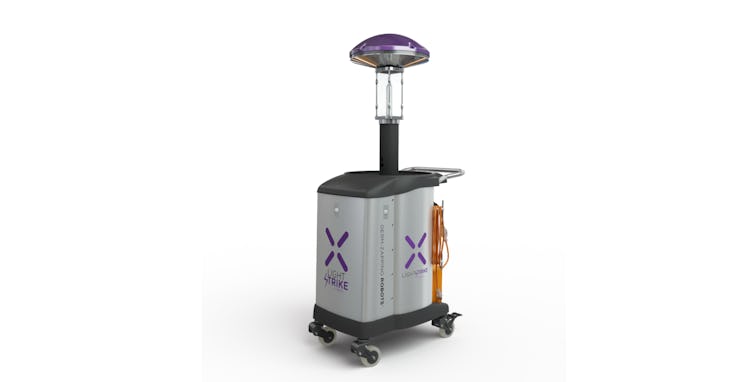The most intimate areas of your vacation will be deep-cleaned by a freaky robot
Hotels, planes, and restaurants want your dollars back. Here are some of their plans to make it safe.

It's something we look forward to all year: summer vacation. This time-honored tradition is an opportunity to get away from the stress of our daily lives and see new places, dip our toes in cool waters, or simply tune out the rest of the world for a few days. But this year, the continuing threat of Covid-19 has thrown that grand tradition for a loop, threatening to cancel it like a pool with bad pH levels.
And it's not just wannabe-tourists who are suffering the loss of their vacations. As a result of Covid-19, 4 million people in the hospitality industry have lost their jobs. More than $21 billion in revenue has also been lost.
The question of "Is it safe to travel this summer?" is on the minds of many, and while there isn't a clear answer yet, freaky googly-eyed robots are here to help us whenever we arrive.
This googly eyed robot feels like a mix between the DNA in 'Jurassic Park' and Clippy from Microsoft Word.
Recent media coverage of the Xenex Disinfection Service's "LightStrike Germ-Zapping" bot -- a purple-capped, semi-autonomous machine that's as tall as a small child -- is designed to scuttle through hospital rooms (and now hotel rooms) with a xenon light column that emerges from its base. The UV light annihilates germs at a molecular level.
While cleaning tech won't make travel completely safe this summer, travel destinations are hoping to provide a little peace of mind with technology like LightStrike. The intention of cleaning tech is to disinfect the most intimate parts of your vacation -- from the bed you'll sleep in, to the bathroom.
How clean is your hotel room?
How can air filtration prevent Covid-19?
Information about Covid-19 is continually evolving, but it is the current understanding of scientists that the virus is spread through small droplets that fall on surfaces or hover in the air. The risk of infection from these hovering droplets is lessened in environments with open air-flow, like an outdoor patio, but there is less opportunity for natural dispersing of these droplets in stuffy environments like hotel rooms or hallways.
Two different Rhode Island getaways Ocean House and Weekapaug Inn, both operated by Ocean House Management Collection, will begin using wall-plug air-purifiers by Molekule is guest rooms ahead of their reopening in June.
The technology behind the Molekule plug-ins is two decades in the making and works by using a process called Photo Electrochemical Oxidation (PECO) to breakdown pollutants -- like mold, allergens, or viruses -- on the molecular level. This allows the tech to filter particles 1,000 times smaller than required for standard HEPA grade filters.
The company also sells small desktop air filters, and their Molekule Air Pro RX was given medical clearance by the FDA for its ability to eliminate bacteria and viruses.
While the Environmental Protection Agency (EPA) says air purification alone won't protect you from Covid-19, it can still play a role in increasing the safety of indoor environments.
How can disinfecting robots prevent Covid-19?
In addition to purifying the air, other hotels are turning to robots to help clean high-touch surfaces like door handles and tables where infectious droplets may have fallen. Xenex Disinfection Services' says its "LightStrike Germ-Zapping Robot," can deliver "intense pathogen killing power" in just five minutes.
This robot designed for disinfecting hospitals is now making its way into commercial hotels.
Instead of spraying potentially poisonous disinfectant in an enclosed environment, the Germ-Zapping Robots instead use xenon light to kill pathogens on the nanometer scale. This robot is used widely in healthcare settings and is also being rolled out this summer in Westin Houston Medical Center hotel, which recently purchased two germ zapping bots, according to USA Today.
How can advanced disinfecting technology prevent Covid-19?
Even though open spaces and the outdoors are relatively safer than crowded indoor environments, that doesn't mean they don't need to be disinfected as well. You can use traditional disinfectant sprays for this, but Saybrook Point Resort & Marina in Connecticut has turned to electrostatic disinfectant spray technology to get the job done.
Designed by Victory Innovations, this technology consists of a backpack-like disinfectant chamber and a spraying hose. What makes this technology different is that it uses electrostatic technology in the spray nozzle to help the spray cling to surfaces it is sprayed on. This approach is not only precise but will also waste less disinfectant solution overall.
This electrostatic disinfectant sprayer is precise and uses less disinfectant overall.
Having a faceless, glowing robot disinfect everything from the bed you sleep on to the light-switches you touch might not be the relaxing vacation you had in mind, but as the hospitality industry -- and the world at large -- begin to slowly transition into more social activities, these technologies will be an important part of keeping us all safe.
This piece has been updated to clarify the types of devices Molekule sells and the strength of its filter.